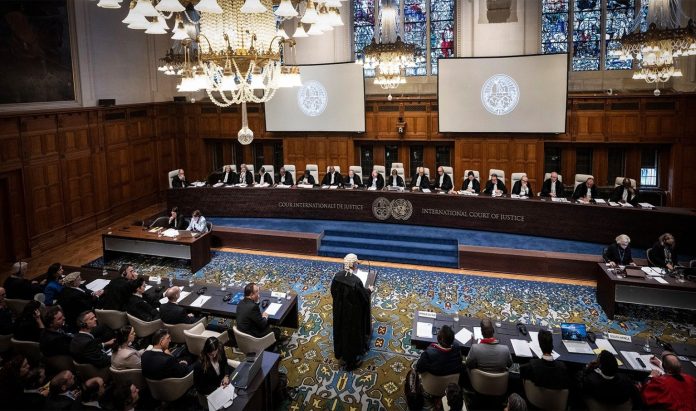The International Court of Justice, the highest judicial body in the United Nations, has affirmed the right of the Palestinian people to self-determination, and that the continued occupation of their lands does not change their legal status approved by international laws and conventions.
On Friday, the court announced its advisory opinion on the legal consequences of the Zionist occupation of the Palestinian territories since 1967, and reached a decision that “Israel is an occupying force in Gaza and the West Bank, including east of occupied Jerusalem/ al-Quds”
Chairman of the Court Judge Nawaf Salam read the advisory opinion in a public session held at the Court’s headquarters in the “Peace Palace” in The Hague, Netherlands, stressing that the Palestinian territories occupied in 1967 represent lands with unity, continuity, and sovereignty that must be respected.
On December 31, 2022, the United Nations General Assembly adopted a resolution requesting the International Court of Justice to issue a non-binding “advisory opinion” on “the legal consequences arising from Israel’s policies and practices in the occupied Palestinian territories, including East Jerusalem,” relating to the long-term occupation. for the Palestinian territories since 1967.
Salam stressed that the continued presence of the occupation authorities in the Palestinian territories occupied in 1967 “is illegal, and that they are obligated to end their presence there as soon as possible, and that the continued occupation of the Palestinian territories for a long period of time does not change their legal status.”
He pointed out that the occupation authorities accelerated the establishment of new settlements in the West Bank, which amounted to more than 24 thousand settlement units, stressing that they must stop all new settlement activities.
Salam stated that the occupation authorities’ confiscation of Palestinian lands and granting them to settlers “is not temporary and violates the Geneva Convention.”
He expressed that the court was not convinced that expanding the application of Zionist law in the West Bank and occupied Jerusalem was “justified,” pointing out that the occupation authorities imposed their authority as an occupying force in a way that contradicts what was stated in Articles 53 and 64 of the Geneva Convention.
He said the occupation authorities cannot “displace the population of the occupied territories or settle some of their citizens there.”
He added transferring settlers to the West Bank or occupied East Jerusalem contradicts Article 49 of the Geneva Convention, and detaining Palestinian property by settlers violates the obligations of the international occupying authorities.
He stated that the court will study the judicial repercussions of the illegal presence of the occupation authorities in the occupied territories, and that “the advisory opinion is based on the premise that the Palestinian territories are territories under occupation.”
Salam stated that the current advisory opinion does not include the war that broke out in Gaza in October 2023.
He explained that the occupation authorities maintained their authority over the Gaza Strip, especially monitoring its air, sea and land borders, and that “Israel’s duties in the occupied territories are subject to the 1959 treaty regarding the treatment of civilians in times of war.”
Salam confirmed that the occupation authorities had abandoned their obligations in the Treaty against Racial Discrimination concluded in 1965, calling on the occupation authorities to adhere to the Sidra Treaty when exercising their powers outside their territories.
The rulings of the International Court of Justice are final for the states parties concerned in the case and are not subject to appeal, according to Article 94 (1) of the United Nations Charter, which stipulates that “every member of the United Nations undertakes to comply with the decision of the International Court of Justice in any case to which it is a party.” Article 94 (2) also states that in the event of non-compliance, “the Security Council may, if it deems it necessary, make recommendations or decide on the measures to be taken to implement the ruling.”
This is the second time that the United Nations General Assembly has asked the International Court of Justice to issue an advisory opinion related to the occupied Palestinian territory.


















